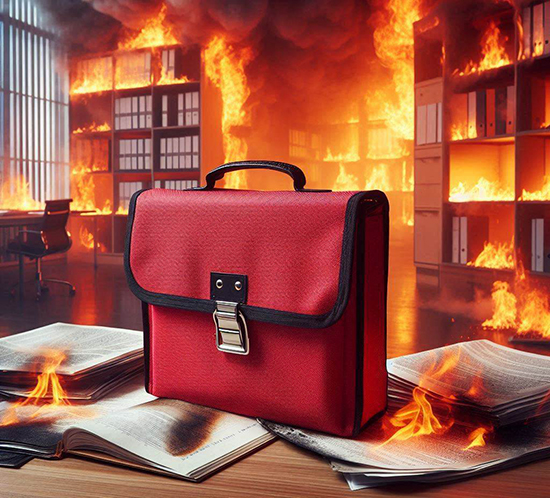For many businesses, disaster preparedness is something that is often overlooked. For this purpose, fire-resistant containers such as a fire resistant document storage bag will come in handy.
In our experience, businesses rarely look into measures for asset recovery in the event of a fire. It’s only when tragedy strikes, that a business owner regrets their lack of action. It’s understandable. Saving lives takes precedence over saving any material possessions in the event of a devastating fire. But that doesn’t mean asset recovery should be overlooked.

Standard File Cabinets Offer No Fire Protection
While file cabinets may offer a convenient way to organize and store documents, they provide zero fire protection. Standard file cabinets are not designed to withstand high temperatures, and critical documents will turn to ash in the event of a fire. This lack of protection can lead to the loss of valuable and irreplaceable paperwork. Should a fire break out in your building, there’s zero chance of recovering documents stored in a regular fire cabinet.

Investing in fire-resistant bags is a prudent alternative for safeguarding the most important documents for your business. While it’s also not ideal to place all your documents in fire-resistant document storage bags because they would be a nightmare to file, you can resort to putting only the most important ones in fire-resistant bags. Every department should have one. Fitted with a fire-resistant silica liner, these bags are engineered to endure extreme heat and can provide a higher level of resistance against fire damage up to 2,500.
Business continuity hinges on the ability to recover from disruptive events. By incorporating fire-resistant bags into your asset recovery plans, you can mitigate potential losses and resume operations more efficiently. In the aftermath of a fire, the odds are good that you can recover whatever is placed in the fire-resistant document storage bag.
Preventing Data Loss in the Event of a Fire: Navigating the Digital Age

Reliance on electronic devices such as laptops, tablets, smartphones, and other storage devices has become integral to both our personal and professional lives. These devices are repositories of valuable data. The loss of such devices to a fire can lead to significant data loss. This loss can disrupt personal lives, halt business operations, or even lead to substantial financial damage for companies.
Ideally, all your data should be backed up in the cloud to prevent loss. If backing up in the cloud is not an option, using a fire-resistant bag to store your electronic devices increases the odds of recovering the storage device. The recovered device might no longer be usable, as fire temperatures can reach up to 1,100°F and even over 2,000°F during flashovers, though they tend to peak around 1,500-1,600°F once flashover subsides. However, as long as the device is intact, there’s a good chance you can still recover hard drives and SD cards to retrieve your data. A fire-resistant bag lined with a silica liner can withstand temperatures up to 2,500°F, which exceeds peak fire temperatures.
Cost-Effective Risk Mitigation
Investing in fire-resistant bags represents a cost-effective strategy for risk mitigation. The potential losses incurred from the destruction of essential documents far outweigh the upfront investment in these protective solutions. Unlike standard file cabinets, which offer minimal fire protection, fire-resistant bags are designed to withstand extreme temperatures and protect their contents from fire damage.
Securing Your Future with a Fire Resistant Document Storage Bag
By investing in fire-resistant bags, individuals and businesses can ensure their essential documents remain safe at a fraction of the cost associated with more extensive fireproof storage solutions. This approach offers robust protection against fire and presents a practical and cost-effective risk mitigation strategy. The peace of mind from knowing important documents are secure is invaluable, making fire-resistant bags a smart and economical choice for safeguarding valuable information.
